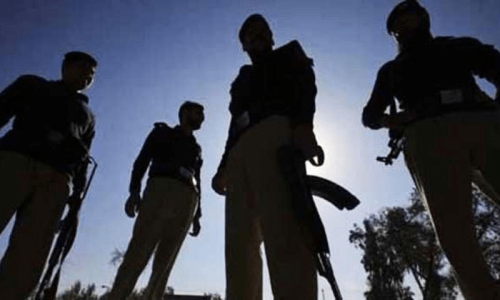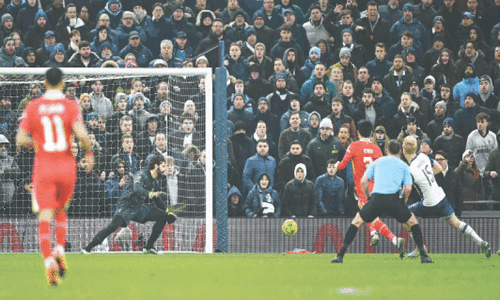ISLAMABAD: For the first time in the history of Pakistan’s parliament, the entire opposition cohort in the National Assembly crossed over to the government aisle following the election of Shehbaz Sharif as the new prime minister, on Monday.
Mr Sharif, who later took oath as the country’s premier, secured 174 votes in a one-sided election in the National Assembly following the en masse resignation of Pakistan Tehreek-i-Insaf (PTI) members.
According to the National Assembly website, Mr Sharif will be the 24th prime minister of the country — not counting caretaker set ups.
PML-N’s Ayaz Sadiq presided over Monday’s proceedings after Deputy Speaker Qasim Suri, who was initially chairing the sitting, said his conscience did not allow him to conduct the session.
Soon after the announcement of the result by Mr Sadiq, Mr Sharif went up to the parliamentary leaders of coalition partners to thank them for supporting him in the election, as the galleries echoed with slogans in his favour.
His niece, Maryam Nawaz — who was seen carrying a photo of her father Nawaz, also greeted Mr Sharif from the speaker’s gallery. The newly-minted PM’s son, Hamza, was also in attendance with many former PML-N parliamentarians.
‘Threat letter’ probe
In his maiden speech as the country’s prime minister, Mr Sharif announced that his first task would be to call a meeting of the parliamentary committee on National Security to receive an in-camera briefing on the issue of the alleged “threat letter” in order to end that controversy once for all.
Terming it “a drama” and “an effort to fool the nation”, Mr Sharif said he would receive a briefing from all NSC members, including the services chiefs, the spy chief as well as the foreign secretary on the controversial diplomatic cable.
He said that Pakistan’s former ambassador in Washington, who had sent the cable, would also be asked to attend the meeting. If it was proven that there was a foreign conspiracy behind the ouster of the PTI government, Mr Sharif claimed he would resign within no time.
“This debate should be laid to rest and I will make arrangements for the in-camera session at the earliest,” PM Sharif said.
“No one was a traitor then and no one is a traitor now,” he added.
After the new PM’s remarks, when Mr Sadiq was giving the floor to PPP Chairman Bilawal Bhutto-Zardari, the deputy speaker appeared again to adjourn the session until April 16.
Suri’s defence
At the outset of the session, Deputy Speaker Qasim Suri — who presided over the sitting as acting speaker following the resignation of Asad Qaiser — forcefully defended his April 3 ruling which was struck down by the Supreme Court.
He said he had given the ruling as a “patriotic Pakistani” and in accordance with his oath.
Showing an envelope to the members of parliament, in a brief and aggressive speech, Mr Suri said that after the decision of the outgoing federal cabinet on April 9 to declassify the controversial diplomatic cable, he would be sending the “threatening letter” to Chief Justice Umar Ata Bandial.
The diplomatic cable, he said, clearly contained the threat that in case the no-confidence motion fails, Pakistan would have to face dire consequences.
“Were talking about an independent foreign policy, an independent economy... and fighting against Islamophobia [the charges against] Imran Khan’s? Was he punished because he refused slavery?” asked the speaker, in an impassioned political speech.
‘Unnatural’ alliance
Mr Suri then gave the floor to PTI vice-chairman Shah Mehmood Qureshi, who was his party’s candidate for the slot of PM against PM Sharif. The erstwhile foreign minister shed light on the achievements of the PTI government, reiterating the claim that Imran Khan had been ousted for pursuing an independent foreign policy.
Terming the opposition’s alliance “unnatural,” Mr Qureshi predicted that it would not long last.
He asked what kind of democracy would it be where “the father would be prime minister and the son would be chief minister”, a reference to efforts to have Hamza Shehbaz elected Punjab CM.
He also stressed the need top have an independent judiciary and election commission.
“Becoming a part of today’s proceedings will give legitimacy to an illegitimate government and we don’t want to be a part of this sin. I was a candidate for premiership but now I am announcing a boycott,” he declared.
He revealed that, in consultation with Imran Khan, PTI members and their friends had decided that they would not be part of this “illegitimate move”.
“We want to have an independent Pakistan. Today, we are all announcing our decision to resign,” said Mr Qureshi, before leading the members out of the assembly hall.
Party vs party
Former prime minister Imran Khan also arrived at Parliament House ahead of the session to preside over a meeting of his party’s parliamentary committee.
When asked to comment on the protests held across the country by PTI supporters on Sunday night, he smiled and said: “God is the one who gives respect.”
Mr Khan categorically declared that his party would not sit in the present assembly.
But when PTI members came to the assembly following a meeting of their parliamentary party, presided by Imran Khan, they shouted slogans against the former opposition. In response, a number of PML-N workers sitting in the visitors galleries responded, causing an uproar that continued for some time.
During Mr Qureshi’s speech, some PPP members, led by Shagufta Jumani, raised the slogan “lota, lota” (turncoat).
It is worth noting that Mr Qureshi had served as the country’s foreign minister under the previous PPP regime, and had been Punjab’s finance minister when Nawaz Sharif was the chief minister of the province.
When some PML-N workers also raised slogans from the galleries, the deputy speaker warned them that they could be removed from the galleries.
While leaving the assembly hall, PTI members raised slogans lambasting the Sharif family, crying “Chor Hai”, which was met with full-throated cries of “Go Niazi Go”.
Some PML-N members also waved good bye to PTI lawmakers as they were leaving the house.
Two members of the Grand Democratic Alliance (GDA) — Dr Fehmida Mirza and Ghous Bux Mahr — however, remained seated in the house for some time and only left the chamber when Mr Sadiq asked the members to proceed to the lobbies to record their votes.
At one point, when Sardar Ayaz Sadiq addressed PM Sharif by his elder brother’s name, the house burst into laughter. The chairperson quickly apologized to a grinning Shehbaz Sharif, adding: “Because Nawaz Sharif lives in our hearts and minds, I called out his name unintentionally.”
PM’s first speech
Taking the dais, Shehbaz Sharif — who is known for making impassioned speeches and toppling mics with his fist — was more restrained and statesman-like in his maiden address.
Terming the country’s economic situation “very serious”, PM Sharif emphasised the need for hard work to improve the economy.
He lamented that the previous government had rejected his proposal of introducing a “charter of economy”.
He announced a slew of new measures, chief among which was an increase in the minimum wage to Rs25,000 from April 1 onwards. He vowed to make Pakistan a “paradise for investments” and appealed to investors to increase the salaries of their employees whose monthly income was Rs100,000 or less.
He also announced a 10 per cent increase in the pension of civil and military pensioners. This, too, would be implemented from April 1, he said.
Moreover, Mr Sharif said wheat flour would be made available at cheaper rates under a Ramazan package. Further, he said, they would address the high prices of electricity and take measures for the progress of smaller provinces.
The newly-elected premier announced that the Benazir Card scheme, which was renamed in the previous government’s tenure, would be reintroduced, adding that the programme would be expanded to cover education as well.
Criticising the PTI government for its foreign policy decisions, he lamented that Pakistan’s strategic partners and friends had abandoned it.
Underlining the importance of having good ties with China, he alleged that the previous government had attempted to weaken the friendship between Islamabad and Beijing. He reassured the house that his government would restart progress on the China-Pakistan Economic Corridor.
SALIENT FEATURES OF NEW PM’S FIRST SPEECH
1- Minimum wage increased to Rs25,000; industrialists urged to hike wages of those earning less than Rs100,000 per month
2- Pensions of retired civil and military personnel increased by 10pc
3- In-camera parliamentary discussion planned on ‘threatening cable’, Shehbaz vows to quit ‘if conspiracy proved’
4- Benazir Card to be re-introduced; will cover education as well
5- Wheat flour, electricity prices to be subsidised
6- CPEC to be re-energised, ties with China to be re-invigorated
Published in Dawn, April 12th, 2022















































Dear visitor, the comments section is undergoing an overhaul and will return soon.